- Home
- Chris Wooding
The Braided Path: Ascendancy Veil Bk. 3 Page 38
The Braided Path: Ascendancy Veil Bk. 3 Read online
Page 38
Behind his Mask, Kakre’s ruined face twisted in an idiot grin.
The rumbling became unbearable, and the earth split.
The noise was colossal. The ground was shaking so violently now that the soldiers were falling over, grasping at each other for support. The artillery juddered out of position; mortars went toppling. On the north side of the Ko, a vast slice of land suddenly dropped away, plunging downward with a grinding roar and a billow of dust. Hundreds of Aberrants pitched squealing into its depths; an instant later a great fan of magma blasted out, high into the night, a pyroclastic fury of black smoke and flame.
Mishani, near-mad with terror, could not be sure if the fearsome cackling visage she saw in the fire was real or imaginary.
The smoke of the explosion spread across the battlefield, whipped and torn by the wind. As the magma splashed to the ground to scald and kill, Mishani thought she saw shapes moving in the smoke, swift darting things like monkeys. At first she imagined they must be skrendel, but they moved with a jerky flicker, never seeming to be quite where she thought they were. They passed among the Aberrants, springing upon them, bending to bite and springing away again. The Aberrant predators were in a panic: even the Nexuses could not control them now. And still the earth shook and smaller rifts spread across the downs, slumped trenches of broken grass and turf.
The smoke blew clear in one patch, and the purple stutter of lightning illuminated the uncovered scene for a moment. Nothing moved there. It was as if the Aberrants had all frozen in place. It was only when she saw one of them crumble that Mishani realised they had been turned to earth, sod effigies of themselves, by the bite of the nimble spirits.
The ground split again, this time beneath one of the feya-kori. With a wail, the demon toppled, and the chasm swallowed it with another fountain of magma.
The armies of the Weavers were being slaughtered. The wind had turned to knives and was cutting the predators and their handlers to pieces. The land was bucking and heaving, and within the smoke that belched from the chasms deadly spirits moved. Lightning played, killing dozens wherever it touched. Only the Weavers remained safe, their defences too strong to be easily tackled.
But through it all came the feya-kori. One of their number had fallen, but they had reached the River Ko now, which seethed as fleeing Aberrants were drowned by the spirits there.
She cannot hold them back! Mishani thought wildly. All this, and she cannot hold them back!
Lucia was motionless, unaffected by the rain or the wind or the shivering of the land. Her face was still uptilted, her eyes now closed, her arms hanging limp at her sides. It took Mishani a moment to notice that her feet were not touching the ground, but that she hovered an inch above it. Only the Xhiang Xhi moved, its fingers flexing as if it were a puppeteer, its wispy body writhing slowly above its host. The moons glared down upon them from behind the churning mess of tattered cloud, as lightning raked across the feya-kori again.
Then the demons halted, right on the bank of the river. Behind them, their army was being decimated. Many were scattering as their handlers died and they reverted to their animal instincts. The demons paid no attention. Their burning eyes were fixed on a single spot, something invisible which had arrested their progress.
Mishani squinted against the storm, and she could see something there. A strange glittering in the rain on the south bank of the Ko, a shimmer in the air as if the veils of droplets had turned to crystal. The soldiers were retreating from that spot as the phenomenon became more pronounced. It separated into three, the light tightening and hardening into form and shape.
Mishani knew what was happening before it was finished. She had heard this tale from Kaiku, long ago.
They were the mad spirits of the moonstorm, the offspring of the goddesses that ruled the night sky. The Children of the Moons had come.
They towered over the soldiers of the Empire. In Kaiku’s story they had been twice her height, but now they had manifested themselves as giantesses, forty feet tall, the same as the demons they faced. They wore the form of women, clothed in decayed grandeur. Their robes were of exquisite finery that had fallen into ruin, and from their wrists and elbows hung ancient artifacts that swung gently as they moved. A cold glow exuded from them, like the brightness of their parents, casting a grim and unforgiving light, and their hair was like feathers. But it was their faces that were most terrible, for their features were smooth like partially melted masks of wax, and they blurred and shifted. Only their eyes were stable, holes of utter black through which might be caught a pulverising glimpse of eternity.
The discipline of the soldiers broke at last and they ran from the monstrous entities. But the spirits were not interested in them. Their abyssal eyes were turned upon the feya-kori, and from beneath their robes they drew thin blades which shone with a cruel luminescence.
Lightning flickered and the sky shrieked as the demons and the spirits faced each other across the river. Then, as one, they plunged in.
The clash was brutal and short. The feya-kori had greater numbers and strength, but they were ponderous in their movements, and the Children of the Moons flowed around them like liquid. The feya-kori swiped and swung, beleaguered by the insignificant attacks of the river spirits, but they could not hit the Children. When the counterstrikes came, the effects were devastating. Mishani saw one of the whirling spirits cut the forelegs away from a feya-kori, so that it toppled face-forward into the river. Another was sliced in half along its midriff and fell into two pieces, the water steaming and bubbling as it toppled. In moments, the five feya-kori had sunk, and the Children of the Moon stood alone.
But they were not alone for long. Scalding vapour rising from their back and flanks, the demons rose out of the Ko with defiant groans, their bodies whole again, rejoined where they had been sundered. The water was turning black with the poison of their presence. The Children, their reactions unreadable, stood motionless.
Then the feya-kori attacked: five of them lunging at the same enemy. Though two of them were cut to ribbons and splashed once again into the befouled river, their target could not avoid the rest. The feya-kori slumped onto one of the Children and it was borne under with an earsplitting shriek. Its brethren were upon the remaining feya-kori instantly, chopping them apart with surgical precision; but when the spirit got back to its feet again, Mishani noted how its movements were jerky, its outline indistinct and its aura less bright. The feya-kori had wounded it.
And the demons were reforming and emerging anew, sloughing off the small spirits of the river that were making futile attempts to drag them under again.
The entities met and matched. The splashing of their combat was like dull explosions under the cries of the storm. Rain-wet blades flickered and darted through the vile muck of the feya-kori, and the demons fell to pieces at their touch; but the spirit that they had hurt was slower now, and one of them caught it with a swipe of one club-like stump, smashing it hard so that it staggered. It guttered like a candle and then stabilised, but its light was noticably dimmer than before. As if it were not quite there as much as the other two.
As this was going on, the remaining spirits had not been idle. The Aberrant army had all but disappeared beneath the maelstrom. The ground was scored with chasms, smoke rolled over everything, small tornados roamed and lightning stabbed from the clouds; yet no move was made by the Weavers to retreat. They knew they would not get far if they turned and ran. Their only hope now lay in getting to Lucia, and that meant going through the Children. So they bent all their will to the feya-kori, and the Sisters did their best to harass and distract the Weavers; but between them, there was still a stalemate, and neither had much influence here.
Now the Children of the Moons raised their swords together and screeched. The noise made Mishani shudder and cover her ears. She was sodden and frozen, huddled and filthy, insensible with fear. The Xhiang Xhi raised its own hands, the spindly digits of mist splaying wide, and from Lucia’s mouth came an equally inhuma
n scream in reply.
The effect was immediate. Mishani could hear it even over the storm. The sussurus of the river, hitherto a background murmuring, increased to an angry hiss. She looked down from the hilltop and saw that the rain-speckled surface of the water, churned with spume, was flowing faster now, dragging the white foam and the dark pollution downstream. The noise intensified, underpinned by a low roar, until it had become a rushing torrent, breaking its banks. The river was in flood.
The armies of the Empire – who had settled at a wary distance from the Ko after the Children had appeared – scrambled to draw back from their positions, but they were too close-pressed to move quickly enough. Some of those at the fringes were caught up in the drastic rise of the river and swept away. Men fought to rescue their companions or fled for cover. The misfortune struck the Aberrants also, but there were none surviving so close to the bank on the north side, and the flood waters merely swept away the dead and those that had been turned to sculptures of earth.
In the river, the spirits and demons faced each other again. Both were noticably struggling against the flow, but they kept their feet. The Children screeched again, and then they struck, cutting through their enemies: five feya-kori went down in pieces.
But this time there was no quarter. The Children allowed them no time to reform. They chopped into the water where the demons had fallen, slicing through the black scum to the sludgy bodies beneath. They squealed in a frenzy, hacking with gleeful cries, their blades throwing polluted water and bits of burning muck in all directions. The river boiled around them, and the slim, ghostly eels of the river spirits thrashed and dodged in between.
Downstream, a small gobbet of filth bobbed to the surface and was carried away for a second before the river spirits enwrapped it and pulled it under. Then came more, chunks of varying sizes that gradually dissolved in the flow.
The Children of the Moons butchered the feya-kori over and over, and the river caught up the pieces and flung them away so that they could not reform again. For almost five minutes the appalling violence continued, until one by one the Children of the Moons stopped cutting, and the river ran clear.
They raised their swords again and gave a scream that could be heard all the way to Saraku, and in response the spirits that were attacking the Aberrant army renewed their assault with savage enthusiasm. The Weavers’ defences crumbled as the feya-kori fell: they had invested so much in the demons that their loss tipped the balance. The Sisters took them apart rapaciously, and as they began to fall the spirits turned on the Weavers too, no longer afraid of their power. In moments, none were left alive.
The Weavers were dead, the Aberrant army scattered or destroyed. Gradually, the smoke dissipated and the extent of the carnage was laid bare to the eyes of the soldiers of the Empire. A cheer went up, swelling as it was joined by others, until the sound of it carried over the storm, over the restless tremors in the ground and the din of the moonstorm and the howl of the wind. The cheer gained shape, and became a chant:
Lucia! Lucia! Lucia!
They had stopped the Weavers, crippled their forces utterly. Even if the Weavers could muster another army now, the forces of the Empire would be able to hold them. For they had Lucia, the girl who commanded the spirits. At last, their saviour had revealed her power. With her, they could march into Axekami and take it back. With her, they could do anything.
But only Mishani was close enough to see that the droplets running down Lucia’s face were not only rainwater. There were tears squeezing from beneath her lids.
Slowly, the Children of the Moons turned their dreadful black eyes upon the soldiers, and the chant faltered and died.
‘Lucia!’ Mishani cried. ‘Lucia, what have you done?’
The first strike of lightning hit one of the artillery positions and annihilated it, destroying the hilltop and everyone on it in a tiara of flame. The second lashed down in the midst of the army, killing a dozen men instantly. The soldiers barely understood what was happening until the shaking of the earth suddenly intensified and it opened beneath them: a long, jagged split ripped the downs, and hundreds of men fell screaming. The wind turned to a localised hurricane, picking people up and flinging them into the river where they were drowned. The army broke down entirely. Soldiers fled, their weapons discarded, crushing each other in their desperate attempts to get away. Thousands upon thousands descended into complete disorder, every one interested only in preserving their own lives against the awful, unknowable forces that had suddenly turned against them.
The Children of the Moons stepped out onto the shore, surveyed the scene of abject panic all around, and began to kill.
The banks of the Ko ran with blood on both sides now. The Children swept here and there with their blades, scything through bodies. Men fell in uneven fractions. The river lapped hungrily outward, flooding ever more, sucking in those who could not escape the torrent. Blackened corpses still crackling with purple electricity lay in ragged circles where the lightning had hit. The smoke was rising again from the gash in the earth, and movement could be seen within it; when it passed, it left turf statues in its wake.
‘Lucia!’ Mishani shrieked from where she lay in the mud. ‘Lucia! Stop them!’
But Lucia could not hear her, and the Xhiang Xhi paid no attention. It waved its hands above its host’s head like the conductor of an orchestra. The Sister that had accompanied her as a bodyguard was looking from the carnage below to Lucia and back, uncertainty in her eyes.
A soldier came crawling up the hillside, fighting against the wind and rain, his eyes fixed on Lucia in supplication.
‘Save us!’ he cried. ‘Save your people!’
But Lucia did not answer.
‘Why won’t you help us?’ he demanded.
The Xhiang Xhi reached down to him, encircling him in its huge, spindly hands, and crushed him to a pulp with a cracking of bones.
Mishani screamed as blood spattered her. The horror and shock were too much. Her mind was frozen, her body paralysed.
Then Lucia jerked violently, as if some invisible force had punched her in the gut. The Xhiang Xhi shrieked, a long, drawn-out wail. And Lucia dropped, falling from where she hovered just above the ground. She collapsed as she hit the earth, crumpling like a ball of paper. The Xhiang Xhi, still attached to her, began to darken and attenuate, reaching toward the west, lengthening like a shadow at the end of the day until it stretched across the whole battlefield and over the horizon, to where the Forest of Xu lay. Then perspective twisted, and it was gone.
The effect on the spirits was immediate: they began to settle and fade. The river went quiet, its flow diminishing and retreating. The smoke from the chasm no longer hung in the air but sank and dispersed. The wind died, dropping from a hurricane to a light breeze. The lightning stopped.
Silence ached. Only the Children of the Moons remained amid the death that surrounded them. Their swords had lowered, and they looked up at the moons above. The clouds were coming apart; the unreal sensation in the air was passing. Even the rain had lessened to a drizzle, and finally stopped altogether.
The moonstorm was over. A shimmer passed across the Children and they disappeared. The three moons drifted their steady way apart in a gradually clearing sky.
Mishani was curled up, trembling, still in shock. The sense that the danger had passed was a relief too precious to believe. She was alive, she was alive, beyond all hope it had seemed. She would have lay there for much longer, if not for one thing: the reason she was even here in the first place.
Lucia.
She crawled on her hands and knees to where Lucia lay. A frail thing, eighteen harvests, her clothing plastered to her body. And red, red blood, soaking her stomach, where she had been shot.
Mishani sobbed her name, gathering her up so that Lucia’s head lay in her lap, and shook her. Lucia’s eyes flickered open, and they were blue and distant. She tried to smile, and coughed instead. Blood ran over her lips and down her chin.
&nbs
p; ‘I’m sorry, Mother,’ she whispered. Mishani knew then that it was not her face Lucia was seeing, but Anais’. Already her gaze was becoming dim.
‘Ssh,’ she said. ‘Ssh, do not speak.’ She looked up at the Sister, who was standing over them and looking down. Her make-up had not even been smudged by the rain. ‘Can you not help her?’ she demanded, her voice shrill.
The Sister shook her head sadly. ‘The power that kept her from the Weavers’ attentions keeps her from ours as well. We cannot touch her. I cannot heal her.’
‘Then what good are you?’ Mishani shrieked. The Sister did not answer, and Mishani turned back to Lucia. ‘What good are you?’ she murmured again, helplessly.
‘I didn’t know,’ Lucia was saying, her eyes roving. ‘I didn’t know they’d take so many. They took so many, Mother. They said they’d only take a few. A few lives to satisfy them. Because they hate us. Because that was their price.’
‘Oh, child,’ Mishani wept. ‘Why? Why did you do it? Why did you agree?’
Lucia coughed again. Her chin and breast were soaked in crimson now. The night had gone still. There seemed nothing in the world but the three of them on the hilltop.
‘I couldn’t let them down . . .’ she whispered.
Mishani began to weep anew at that. Gods, this poor girl, this appointed saviour who had spent every moment of ten years under the crushing expectation of the world. Could she have walked out of that forest a failure, after all the lives already given in her name? No. She had taken the Xhiang Xhi’s bargain: a sacrifice in return for the spirits’ help. Mishani could only imagine how that had torn her apart.
And now she was here in Mishani’s arms, a rifle ball in her. Her skin was grey, her hair in wet draggles. Her slowing heartbeat pulsed in the crook of her collarbone. She was seeing beyond, into somewhere Mishani could not follow.
‘Help me, Mother,’ she said, her voice trembling. ‘I don’t want to die. I don’t want to die.’

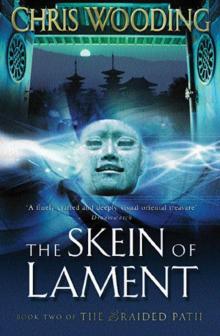 The Skein of Lament
The Skein of Lament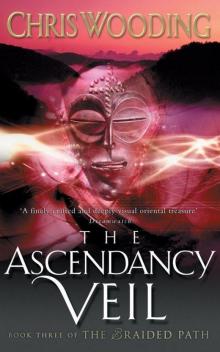 Braided Path 03 - The Ascendancy Veil
Braided Path 03 - The Ascendancy Veil The Ace of Skulls
The Ace of Skulls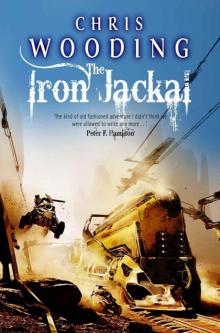 The Iron Jackal
The Iron Jackal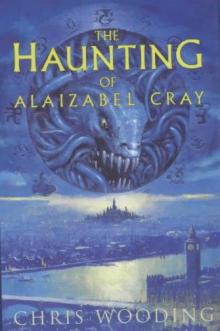 The Haunting of Alaizabel Cray
The Haunting of Alaizabel Cray The Braided Path: The Weavers of Saramyr / the Skein of Lament / the Ascendancy Veil
The Braided Path: The Weavers of Saramyr / the Skein of Lament / the Ascendancy Veil Storm Thief
Storm Thief Silver
Silver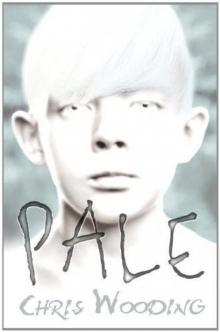 Pale
Pale Poison
Poison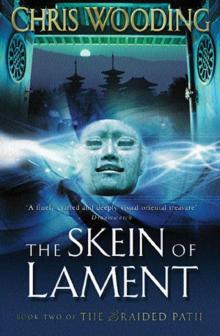 Braided Path 02 - The Skein Of Lament
Braided Path 02 - The Skein Of Lament The Ember Blade
The Ember Blade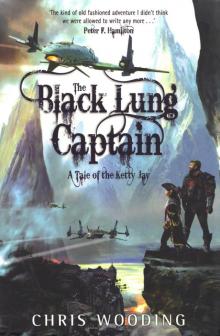 The Black Lung Captain
The Black Lung Captain Out of This World
Out of This World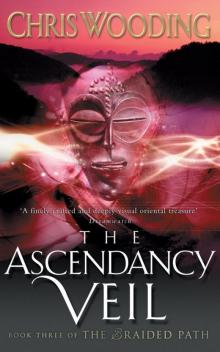 The Braided Path: Ascendancy Veil Bk. 3
The Braided Path: Ascendancy Veil Bk. 3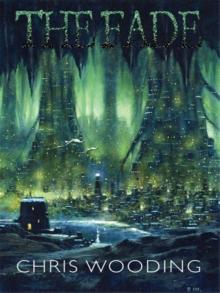 The Fade kj-2
The Fade kj-2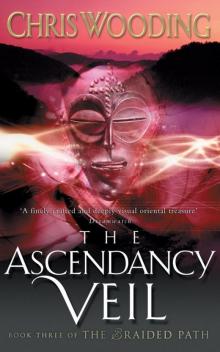 The Ascendancy Veil: Book Three of the Braided Path
The Ascendancy Veil: Book Three of the Braided Path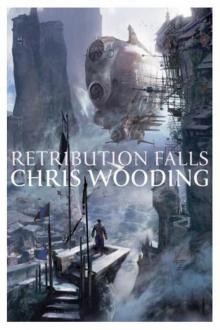 Retribution Falls totkj-1
Retribution Falls totkj-1 The Braided Path: The Weavers of Saramyr, The Skein of Lament and the Ascendancy Veil
The Braided Path: The Weavers of Saramyr, The Skein of Lament and the Ascendancy Veil Ketty Jay 04 - The Ace of Skulls
Ketty Jay 04 - The Ace of Skulls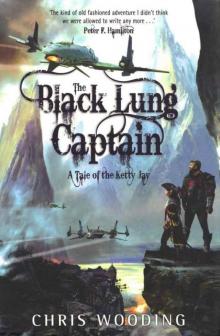 The Black Lung Captain totkj-2
The Black Lung Captain totkj-2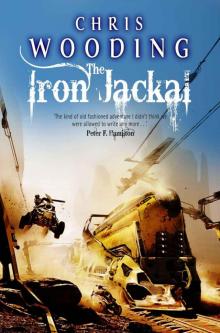 The Iron jackal totkj-3
The Iron jackal totkj-3 The Ace of Skulls totkj-4
The Ace of Skulls totkj-4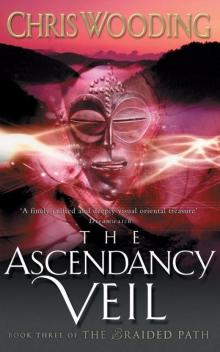 The ascendancy veil bp-3
The ascendancy veil bp-3